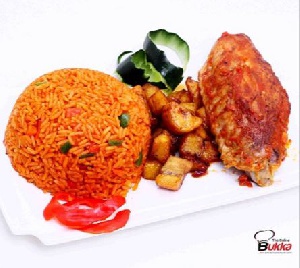 A rich orange-red delicacy made from rice and a spicy stew mixing tomato, onions, meat or fish
A rich orange-red delicacy made from rice and a spicy stew mixing tomato, onions, meat or fish
Don’t mess with West Africans and their favourite recipe – as these western chefs and supermarkets learned the hard way.
Every culture has a sacrosanct recipe passed down from generation to generation. But few cause as much controversy as jollof rice, West Africa’s beloved staple dish.
A rich orange-red delicacy made from rice and a spicy stew mixing tomato, onions, meat or fish, its origins – and how best to prepare it – have been the subject of fierce dispute over the years.
As Reina Yaidoo explains: “Every country has its own version, and abhors ‘inauthentic’ variations.” In Ghana, jollof is eaten on its own or with fried plantains and “the addition of green, leafy plants is much frowned upon.”
In Nigeria, diners balk at adding garlic, carrots, green beans or cabbage and, in Yaidoo’s home country of Liberia, “a stunned silence would greet anyone adding seafood to jollof rice,” she says.
So, on the occasion of World Jollof Rice Day, which is being celebrated by Africans at home and in the diaspora, here are five times West Africa’s favourite dish caused controversy.
Jamie Oliver’s #JollofGate
Eager to try out his own version, celebrity chef Jamie Oliver accidentally unleashed the fury of his West African fans when he posted an experimental recipe for jollof on his website in 2014.
His sin? Advising readers to add coriander, parsley and lemon, none of which are traditionally associated with the dish.
Ozoz Sokoh, author of the Kitchen Butterfly food blog, empathised with Oliver but said the dish is so essential to West African culture that “at home and in the diaspora, we will take up arms to defend anything and everything about it – its origin, preparation and by God, how it is served.”
The meltdown eventually led a representative from Oliver’s camp put out a disclaimer, emphasising this was just “Jamie’s twist”.
“It was like watching a mosquito enter the room while an African family is mid-argument,” wrote website The Fader. “As soon as people noticed the counterfeit jollof (which included cherry tomatoes, parsley, and lemon wedges), they killed it. Quick.”
The diss track
Earlier this year Ghanaian singer Auntie Deborah entered the long-standing rice wars with her release of Ghana Jollof, an anthem dissing the Nigerian version of the dish.
She denounced the rival recipe as “snow white”, a reference to the acute tomato shortage in Nigeria at the time. The singer also described it as “Dencia white”, alluding to the Cameroonian-Nigerian singer of the same name who has her own line of skin-whitening products.
An accompanying video in which she cooks the “proper version” while extras dressed as Nigerians cook a seemingly substandard one garnered a lot of attention in Ghana and in the YouTube comments section a heated debate is ongoing.
The time Tesco had to backtrack
Tesco learnt a lesson on how not to mess with Africans when, in 2014, it was forced to take down a recipe on jollof rice off its website after a backlash.
Published as an accompaniment to the store’s new microwavable jollof packs, the recipe suggested among other things that the dish would take 30 minutes to cook and substituted tomatoes with sweet peppers.
The campaign against the supermarket giant was spearheaded by blogger Belle of BlaBla Land, who called the Tesco recipe “baffling” and asked: “who will be fired for this great misjustice [sic] to Africa?!”
Ghanaian scrum
At a recent rally of the ruling National Democratic Congress ahead of presidential elections, the adage “a hungry man is an angry man” was tested when attendees got caught up in a free-for-all fight over jollof rice.
According to local blogs, party officials had brought food to share at the rally, but a combination of greed and impatience sparked a fight as people scrambled to get a serving.
Nigerian bloggers picked up the news, mocking their neighbours and describing the event as a “crazy happening”.
It’s not the first time the dish has made an appearance in Ghanaian politics: a 2014 presidential aspirant offered branded packs of jollof rice to his party delegates ahead of a party congress. Not that the strategy was effective – he reportedly received just one from a possible 51 votes.

Keri Hilson takes on Lagos jollof
Engaged to Serge Ibaka, a basketball star of Congolese descent, and having been to Nigeria a few times, American singer Keri Hilson tweeted ahead of her visit to Lagos in May to tell fans she was looking forward to tasting jollof again.
The Nigerian blogosphere instantly lapped up her tweet, thrilled that its version had been somewhat endorsed by the superstar. “American singer, Keri Hilson reunites with jollof rice,” exclaimed the popular website YNaija.